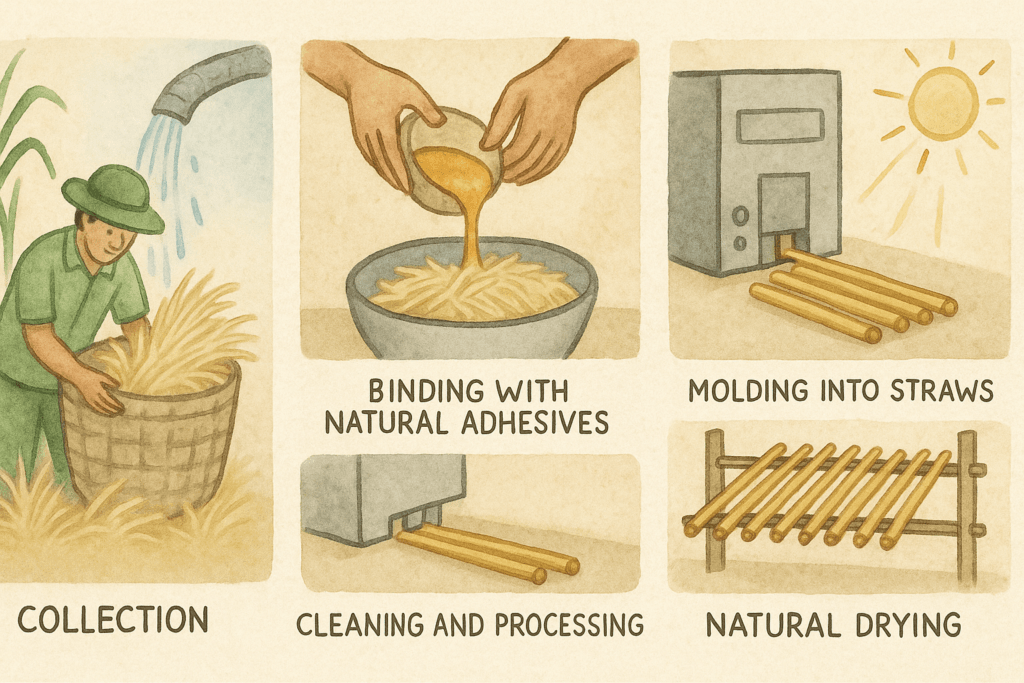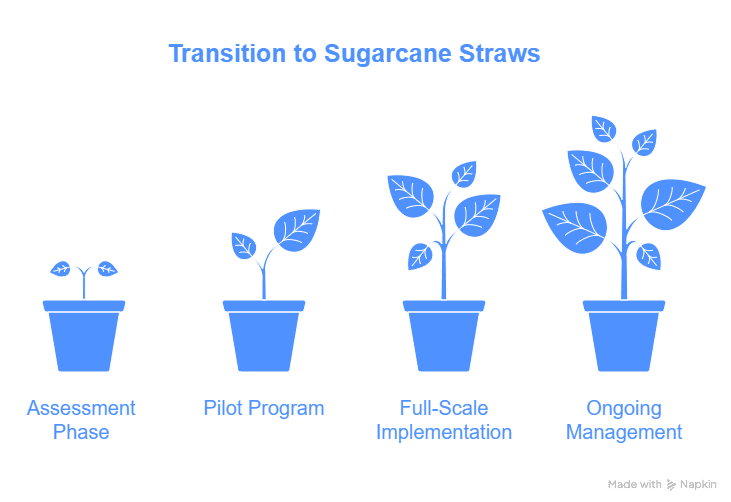
Executive Summary
As the global foodservice industry faces growing pressure to adopt sustainable practices, the shift toward eco-friendly alternatives to single-use plastics has become a driving force in operational innovation. Sugarcane straws have emerged as a leading solution, offering significant environmental benefits without compromising on performance. This blog delves into the science, market trends, and practical steps for sustainability officers in the foodservice industry to transition to sugarcane straws, while highlighting real-world success stories and strategic recommendations.
The Environmental Impact of Plastic Straws
Plastic straws, which contribute significantly to the global plastic waste crisis, are responsible for severe environmental damage. It is estimated that over 500 million plastic straws are used daily in the U.S. alone—enough to wrap around the Earth 2.5 times. These straws take centuries to decompose and often end up in our oceans, harming marine life and disrupting ecosystems. The foodservice industry plays a pivotal role in this environmental challenge, but also possesses the power to drive large-scale change toward sustainability.

Why Sugarcane Straws Are the Future of Sustainability
Composition and Manufacturing Process
Sugarcane straws are crafted from bagasse, the fibrous byproduct left after sugarcane juice extraction. This innovative production process transforms agricultural waste into a valuable and fully compostable product, reducing the need for petroleum-based plastics and minimizing environmental impact.
The process involves:
- Collection of Bagasse: Sourced from sugar production facilities, which would otherwise discard it.
- Cleaning and Processing: The fibers are purified and prepared for molding.
- Binding with Plant-Based Adhesives: Natural adhesives are used to ensure the product is free from harmful chemicals.
- Molding and Drying: The straws are molded into shape and dried naturally to minimize energy consumption.
This sustainable production model is an essential step in building a circular economy.
Environmental Benefits: Data-Backed Insights
Lifecycle assessments reveal that sugarcane straws provide substantial environmental benefits over traditional plastic and other eco-alternatives. Here’s a comparison of key environmental factors:
| Environmental Factor | Sukerkanaj Pajloj | Paperaj Pajloj | PLA (Corn-Based) Straws | Plastaj Pajloj |
|---|---|---|---|---|
| Carbon Footprint | 80% reduction vs plastic | 50% reduction | 65% reduction | Baseline |
| Water Usage | Moderate | Alta | Moderate | Malalta |
| End-of-Life Decomposition | 90 days in composting | 30-60 days | 180+ days | 200+ years |
| Ocean Impact | Minimal harm | Low-moderate harm | Moderate harm | Severe harm |
| Resource Renewability | Annually renewable crop | Annually renewable | Annually renewable crop | Non-renewable |

These findings underline the superior environmental performance of sugarcane straws, making them a leading choice for businesses looking to embrace sustainability.
Market Growth and Industry Adoption
The demand for compostable straws is rapidly growing, with the global market projected to reach $924.1 million by 2025, growing at a compound annual growth rate (CAGR) of 13.6% from 2020. Sugarcane-based products are capturing an increasing share of this market, driven by their competitive advantages and performance characteristics.
Real-World Case Studies: How Businesses Are Leading the Change
Luxury Hotel Chain: A Global Success
In 2022, a renowned international hotel chain, operating in over 35 countries, switched to sugarcane straws across all its 246 properties. The transition achieved remarkable results:
- 12.8 million plastic straws eliminated annually
- 97% positive customer feedback regarding the new straws
- $45,000 in annual tax incentives
- Strengthened brand perception among eco-conscious travelers
- No operational disruptions during the switch
This success story highlights how sustainability initiatives can lead to both environmental and financial rewards, without compromising customer experience.
Quick-Service Restaurant Chain: A Phased Transition
A national quick-service restaurant chain with over 1,200 locations implemented a phased transition to sugarcane straws, yielding impressive outcomes:
- 28.5 million plastic straws eliminated in the first year
- 89% customer satisfaction with the new straws
- An initial 12% cost increase offset by an 8% increase in customer loyalty program sign-ups
- Improved sustainability metrics, aligning with corporate investors’ requirements
This case demonstrates the feasibility of scaling sustainable solutions across large, multi-location businesses.
Operational Considerations for Foodservice Sustainability Officers
Cost-Benefit Analysis: Understanding the Value Proposition
While sugarcane straws can cost 1.5-2x more than traditional plastic straws, the benefits far outweigh the additional costs:
- Consumer Demand: 76% of consumers are more likely to choose businesses that demonstrate visible sustainability practices.
- Regulatory Compliance: By transitioning to eco-friendly alternatives, businesses can avoid fines and potential regulatory penalties.
- Marketing Value: Eco-friendly initiatives enhance brand image, attracting new customers and improving customer retention.
- Tax Incentives: Many regions offer incentives for businesses that adopt sustainable practices.
- Bulk Purchasing: Suppliers like MOMOIO provide bulk purchasing options that reduce the cost per unit.
Steps for a Successful Implementation
A strategic transition to sugarcane straws requires careful planning:
- Assessment Phase:
- Audit current straw usage and sustainability goals
- Compare multiple eco-friendly alternatives, including sugarcane straws
- Calculate lifecycle costs and determine operational needs
- Pilot Program:
- Test sugarcane straws in select locations
- Gather customer and staff feedback
- Measure initial performance
- Full-Scale Implementation:
- Roll out sugarcane straws across all locations
- Ensure comprehensive staff training
- Implement a clear communication strategy for customers
- Track sustainability impact metrics for stakeholders
- Ongoing Management:
- Perform regular supplier evaluations to ensure product quality
- Offer staff refresher courses on sustainability practices
- Publish sustainability reports for transparency

Storage and Handling: Best Practices
MOMOIO’s sugarcane straws offer practical advantages in terms of storage and handling:
- Moisture Resistance: Sugarcane straws remain intact for up to 4 hours in cold beverages and 2+ hours in hot drinks.
- Shelf Life: These straws have a 12-month shelf life when stored in dry conditions.
- Standard Food-Grade Storage: No special handling or storage protocols are required beyond typical food safety guidelines.
Key Certifications and Industry Standards
When sourcing sugarcane straws, look for suppliers that offer:
- Certified Compostability:
- BPI certification
- ASTM D6400 Kaj EN13432 compliance
- Sustainability Certifications:
- Non-GMO verification
- Fair labor practices certification
- Performance Guarantees:
- Clear specifications on temperature tolerance, liquid compatibility, and structural integrity.
MOMOIO offers these certifications and more. Visit MOMOIO’s Certification Page for details on our sustainability commitments.
Overcoming Common Challenges
Customer Perception Management
Effective communication is crucial to ensure customer buy-in. We recommend:
- Table cards or tent cards explaining the benefits of sugarcane straws
- Social media campaigns featuring the transition
- Staff training on how to discuss the sustainability efforts with customers
Staff Training
Training your team ensures a smooth transition:
- Educate staff on the environmental benefits of sugarcane straws
- Provide clear guidelines on straw handling and composting procedures
- Address common customer questions regarding the new straws
Disposal and Composting
To maximize environmental impact:
- Partner with local commercial composting facilities
- Train staff on proper separation and disposal procedures
- Incorporate composting of other foodservice items alongside straws
Conclusion: Transforming the Foodservice Industry with Sugarcane Straws
The transition to sugarcane straws offers foodservice businesses a unique opportunity to lead the way in sustainability while also benefiting from increased customer loyalty and regulatory compliance. By partnering with MOMOIO, your business can access high-quality sugarcane straws, receive expert implementation support, and showcase your commitment to sustainability.
To learn more or to request a sample, visit MOMOIO’s Foodservice Solutions.






